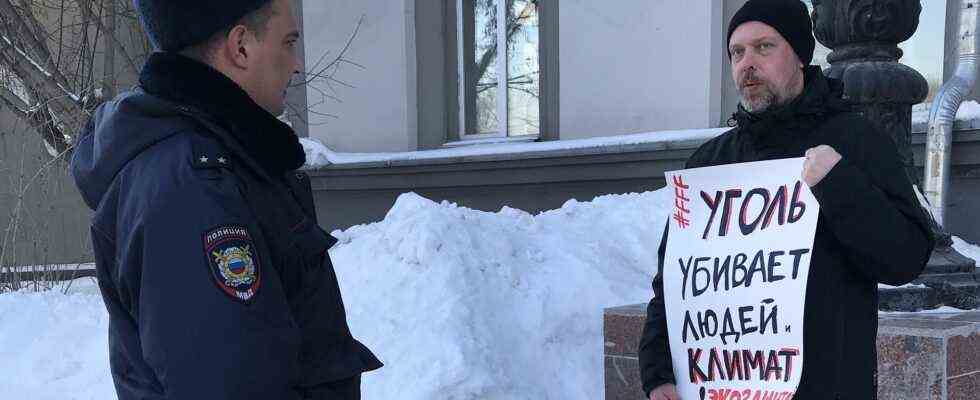Status: 01.12.2021 6:38 p.m.
The Russian environmentalist Sliwjak has prevented many environmentally hazardous projects for decades. For this he has now received the Alternative Nobel Prize. That does not protect him from state pressure.
The old Kaliningrad cellulose factory still stands today. Vladimir Sliwjak smiles as the cell phone camera pans along the crumbling red brick facade. The broken windows are reflected in deep puddles.
It all started with this factory at the end of the 1980s, explains the 48-year-old, who currently works from Germany. She was notorious for dumping her waste, including carcinogenic toxins, unfiltered into the river. The river was as good as dead. The stench in the city was unbearable.
Protests that will soon spread
At some point it was enough for Vladimir Sliwjak. Together with a few fellow students, he founded a movement that a little later became the environmental protection organization “Ekosaschita”. They started organizing protests.
Ten thousand people took to the streets in Kaliningrad in 1990. More than ever before. In the end, they actually prevailed: the factory was closed. A surprise success that was followed by further local initiatives and later nationwide campaigns: Successful anti-coal campaigns in Siberia, protests against nuclear power and deliveries of nuclear waste.
In the meantime, “Ekosaschita” takes care of the whole range of environmental issues – here Vladimir Sliwjak protested in March 2020 against the climate-damaging coal mining in Russia.
Image: picture alliance / dpa
An Akw is prevented
When Sliwjak and his organization succeeded in preventing the construction of a new nuclear power plant near Kaliningrad in 2013, even though the foundation stone had already been laid, the authorities hit back – and declared Ekosaschita a “foreign agent”.
Sliwjak sued in vain against the classification. To this day, the organization refuses to wear the stigmatizing title publicly, which has resulted in dozens of legal proceedings and high fines. “But because we are not a commercial organization and do not earn any money, we could not pay these fines,” reports Sliwjak. Criminal proceedings have therefore been initiated against his colleague in Kaliningrad, Alexandra Koroljewa. You had to leave Russia in order not to end up in prison.
Work in Russia continues
Even if the leaders of the environmental protection organization are now in Germany, there are still activists and scientists on site who are continuing the work of “Ekosaschita” in Russia. One of them is the geographer Larissa Stantschenko.
Like Sliwjak, it is also committed to preserving the Curonian Spit: the narrow stretch of land that connects Russia and Lithuania. For years it has been documenting how the fragile ecosystem, which is a UNESCO World Heritage Site, is changing. “There are more than 300 aisles in the dunes along the entire length of the beach. You can even see them on satellite images.”
In fact, the damage to the protective foredunes can be seen with the naked eye. In some places the ground has sagged. The beach has become narrow. The wind drives the sand deeper and deeper into the forest. The pines are dying. Environmentalists warn that something urgently needs to be done to preserve the dunes. Otherwise the sea would advance further and further. The administration of the national park is now declining. She seems to be more interested in the income from the many tourists than in spending on nature.
Hope for a new generation
But giving up is not an option for the environmentalists around Vladimir Sliwjak. He places his hopes on the younger generations, some of whom he helped train: at schools, in holiday camps and at the Moscow School of Economics, where he taught from 2012 to 2015.
They have a completely different understanding of climate and environmental policy than Russian policy, which speaks of climate neutrality – but thinks more of the sale of new nuclear power plants than of ways to sustainably reduce CO2 emissions.
Russia also relies on nuclear power for its energy supply – for example with the floating Akw “Akademik Lomonossow”
Image: picture alliance / Dmitri Lovets
“Professionals in taking advantage of the smallest opportunities”
There is a lack of innovations, says Sliwjak. Also because civil society, which can provide the state with ideas, is undesirable and is being suppressed. “But no matter how difficult times are in Russia at the moment: there is always an opportunity. And we are professionals in taking advantage of the smallest opportunities.”
Sliwjak also sees the alternative Nobel Prize as an opportunity. He draws attention to the great unsolved environmental problems and the difficult situation of activists in Russia. And the prize money was great for financing new projects.
Who, if not we? Alternative Nobel Prize for Vladimir Slivyak
Christina Nagel, ARD Moscow, December 1, 2021 9:06 am

